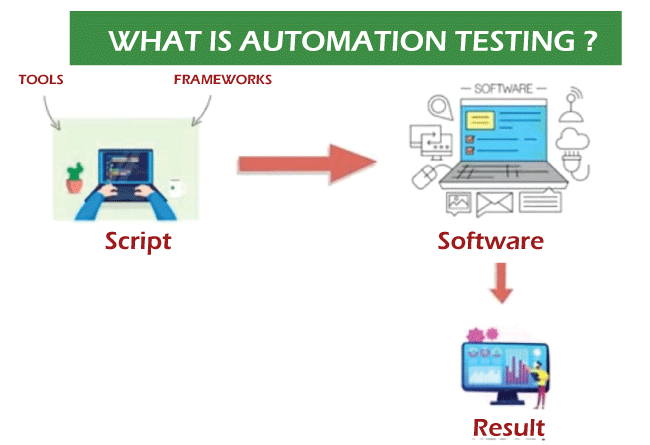The Future of Software Program Growth: Using the Possible of Automation Checking for Faster, Extra Reliable Launches
The possible advantages of automation testing are huge, appealing not only to expedite launch cycles however likewise to boost the overall quality and uniformity of software application items. In a landscape where rate and precision are critical, harnessing the abilities of automation testing stands as an essential strategy for staying in advance.
The Power of Automation Checking
In the world of software program development, the execution of automation screening has actually shown to significantly enhance effectiveness and quality control processes. By automating recurring and taxing manual screening tasks, software program groups can streamline their testing efforts, decrease human mistakes, and speed up the total development lifecycle. Automation testing enables for the quick execution of examination instances across different settings and configurations, providing developers with quick comments on the top quality of their code adjustments.
One of the vital advantages of automation screening is its capability to boost examination coverage, guaranteeing that even more capabilities and functions are completely checked. This thorough testing method helps determine problems early in the advancement cycle, lowering the possibility of costly pests reaching production. Additionally, automation testing advertises constant assimilation and constant delivery methods, allowing teams to launch software application updates extra regularly and dependably.
Accelerating Launch Cycles
The velocity of launch cycles in software program growth is essential for staying affordable in the rapidly evolving tech landscape. Reducing the time between releases permits business to react promptly to market needs, include customer feedback immediately, and outmatch rivals in supplying ingenious features. By leveraging and embracing active techniques automation testing devices, advancement groups can simplify their processes, recognize pests previously, and guarantee a higher quality item with each release.
Speeding up launch cycles likewise enables software application companies to maintain an one-upmanship by quickly attending to security susceptabilities and adapting to altering regulative needs. Constant launches help in structure client trust and commitment as customers profit from continuous renovations and bug repairs. This repetitive strategy promotes a culture of continuous improvement within development teams, urging collaboration, technology, and a focus on delivering worth to end-users.
Guaranteeing Regular High Quality Assurance
In the middle of the increased release cycles in software advancement, preserving constant top quality guarantee comes to be paramount for guaranteeing that each version fulfills the greatest criteria of functionality and reliability. Consistent quality assurance involves an organized approach to testing and assessing software application to identify and correct any concerns or defects quickly. To accomplish this, software advancement groups should develop durable QA procedures that are incorporated throughout the advancement lifecycle. This includes defining clear high quality standards, conducting comprehensive testing at each stage of advancement, and leveraging automation screening devices to enhance the procedure.
Overcoming Common Testing Difficulties
Addressing and solving typical screening obstacles is important for making certain the effectiveness and performance of software application growth procedures. One prevalent challenge is the lack of extensive test protection, where testers may overlook specific circumstances, causing prospective pests slipping right into the final item. This issue can be mitigated by extensive test preparation, including diverse screening strategies, and leveraging automation screening to boost coverage. An additional website here common difficulty is the upkeep of examination scripts, particularly in active settings where constant changes occur. Examination manuscript upkeep can be streamlined by utilizing durable test automation structures that use simple script alterations and updates. Furthermore, coordinating screening initiatives across various groups and divisions can present a challenge due view publisher site to communication gaps and varying top priorities (automation testing). Implementing clear interaction channels, developing standard processes, and cultivating cooperation with devices like issue trackers and project administration systems can assist overcome this obstacle and make certain seamless screening sychronisation. By proactively dealing with these difficulties, software program development teams can improve the top quality and dependability of their releases.
Applying Automation Checking Techniques

When the examination situations are selected, groups should spend time in making durable examination manuscripts that are maintainable, recyclable, and scalable. Collaboration between designers, stakeholders, and testers is essential to make sure that the automation testing straightens with the total job objectives and demands. Continual combination and release pipelines can additionally simplify the automation screening process by instantly activating examinations whenever new code description is committed. By taking on automation screening approaches, software program growth groups can attain quicker checking cycles, greater test protection, and ultimately supply more reliable software program launches.
Conclusion
To conclude, automation screening offers an effective device for accelerating release cycles, ensuring regular quality control, and overcoming usual screening difficulties in software development. By utilizing the capacity of automation testing strategies, organizations can achieve quicker and much more trustworthy launches. automation testing. Accepting automation screening is crucial for remaining competitive in the fast-paced world of software development

In final thought, automation testing provides a powerful device for speeding up release cycles, ensuring consistent high quality assurance, and getting rid of common testing challenges in software application growth.